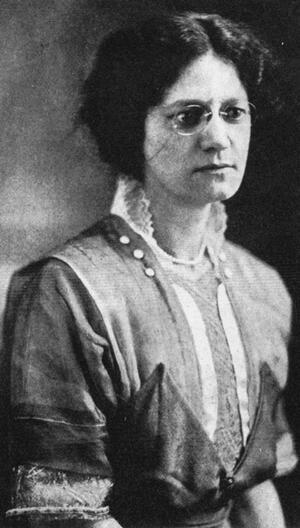Immigrant Mary Antin packs the house at the Waldorf Astoria.
Writer Mary Antin (1881-1949).
Institution:The Jacob Rader Marcus Center of the American Jewish Archives, Cincinnati, OH, and the New York Public Library.
“I was born, I have lived, and I have been made over. Is it not time to write my life’s story?”
So begins The Promised Land, Mary Antin’s classic story of a young immigrant’s transition from the Russian Pale to Boston’s South End. Published in installments by The Atlantic Monthly in 1911, the book was received with great acclaim, prompting the sold-out gathering at the Waldorf Astoria Hotel in New York to see Antin on December 8, 1912.
Immigrating to America at age 13, Antin exchanged the poverty of the area of western Russia where Jewish people were required to live for a similar kind of poverty in Boston. But the public school system provided the intelligent child a glimpse of a way into a better life. After only four months in school, Antin wrote a composition entitled “Snow” that was published in Primary Education. Her poems were published in Boston newspapers, and when she graduated grammar school in only four years, her accomplishments were lauded “as an illustration of what the American system of free education and the European immigrant could make of each other.”
Her letters as a teenager to her uncle in Russia were published as From Plotzk to Boston in 1899, and the proceeds enabled her to continue her education at Boston’s Girls’ Latin School. She married geologist Amadeus Grabau in 1901 and moved with him to New York City, where he taught at Columbia University.
The success of The Promised Land led Antin to lecture tours across the country, where she advocated for greater opportunities for immigrants, more liberal immigration policies, and for the Zionist movement, a cause she felt was in no sense incompatible with her devotion to her adopted land. But the outbreak of World War I, her husband’s loss of his position, and his relocation to China led Antin to develop neurasthenia (often diagnosed today as chronic fatigue syndrome). She returned to Massachusetts, where she continued her involvement with social welfare activities. She died of cancer in 1949, but The Promised Land, her love letter to the spirit of America, would retain its attraction as the quintessential work for immigrants and their advocates.
As Antin wrote in that book, “I thought it [a] miracle that I, Mashke, the granddaughter of Raphael the Russian, born to a humble destiny, should be at home in an American metropolis, be free to fashion my own life, and should dream my dreams in English phrases.”
Source: “Crowd Gathers to Hear Writer Mary Antin,” Mass Moments.



